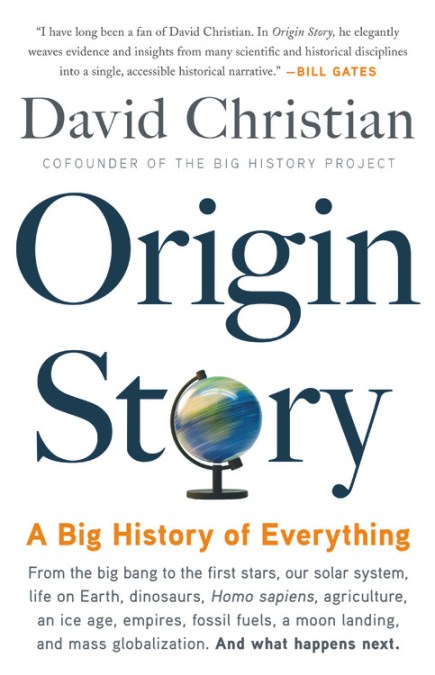I've begun reading David Christian's new book Origin Story: A Big History of Everything. I expect it will furnish a broad overview of cosmic and human history, a good thing. But I also expect I will end up agreeing with what Washington Post columnist Michael Gerson says about it. Gerson's column in today's Post, "This story of everything misses what matters most," congratulates Christian on a fine book:
Christian has achieved something remarkable: an engaging guide to the physics, chemistry, biology, anthropology, linguistics and sociology that constitute the story of history itself. The author practices what he calls “Big History” — gathering the Big Bang, the advent of molecules, plate tectonics, eukaryotes, dinosaurs, Homo sapiens, climate dynamics and globalization into one sweeping arc. In roughly 300 pages. With no equations.
Yet:
Christian has written a book that succeeds at everything except its stated purpose. Ultimately he wants to provide a replacement for traditional origin stories that come from religion. These he finds contradictory and outdated. But human beings are wired to need explanatory stories, revealing, as Christian writes, “ This is what you are; this is where you came from.” Without this rooting, people can become victim to a “sense of disorientation, division and directionlessness.”
... Christian ... repeats the defining mistake of scientism: the unquestioned assumption that all rational knowledge is scientific knowledge. This is anything but humble. It is a kind of epistemological imperialism that excludes knowledge coming from moral and philosophical reasoning, from theological argumentation and from historical investigation based on reliable witnesses. Not to mention the kind of knowledge that someone loves us. Christian attempts to increase the certainty of knowledge by limiting it to less consequential things. It makes the Cosmic Egg more like a Faberge egg — ornate, beautiful and, ultimately, useless.
As to God, the claim that modern science can provide no direct evidence for a being apart from the natural world is tautological. Does Christian expect transcendence to be like a gas that glows blue when heated?
Christian is a secular humanist, as he makes clear right away in his book. (Aren't "Christian" and "secular humanist" supposed to be antonyms?) My last post, "An Open Letter to Steven Pinker," was addressed to another secular humanist, Dr. Pinker, author of another recent book, Enlightenment Now: The Case for Reason, Science, Humanism, and Progress.
It doesn't take a rocket scientist to see that in today's world a lot of the best minds are those of secular humanists. But not all: Mr. Gerson is a case in point. I side with Mr. Gerson. I think the sum total of our human knowledge that comes only from science, reason, humanism, and progress is like an ewer without a handle. We ultimately need the handle of transcendence beyond the tangible world to overcome our deep “sense of disorientation, division and directionlessness."

No comments:
Post a Comment